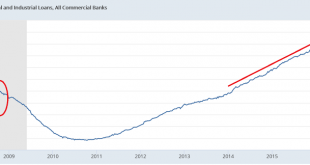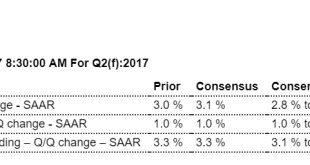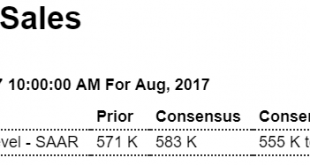Two days ago this blog published a blogpost by Jaques Sapir, a French economist, who stated that access to his RussEurope blog had been suspended because his posts had become to political… Interestingly, in the May 2008 issue of theReal World Economics Review, at a time when Jean-Claude Trichet, a French economists and former head of the ECB, still denied the crisis and even increased interest rates (22 July 2008: +0,25%), Sapir already had a keen insight into the nature and severity of...
Read More »Credit check, Expectations vs spending, Inflation, Comments on Fed policy
You may be hearing about ‘spike’ in lending last week, so I’ll try to give you some perspective using commercial and industrial lending charts before just showing year over year changes: In this 10 year chart you can see how the growth in lending suddenly slowed back in November 2016. You can also see that last week’s spike up is something that’s happened many times and looks like ‘normal volatility’ and, at least so far, not an indication of something unusual happening...
Read More »Genes, Violence, and Testing
The abstract of an article in Molecular Psychiatry entitled Genetic background of extreme violent behavior reads as follows: In developed countries, the majority of all violent crime is committed by a small group of antisocial recidivistic offenders, but no genes have been shown to contribute to recidivistic violent offending or severe violent behavior, such as homicide. Our results, from two independent cohorts of Finnish prisoners, revealed that a...
Read More »Tax Fog
from Peter Radford Whenever we are told about a Trump plan we have to use the word “plan” very carefully. Thus far Trump’s various plans have been more vague suggestions, hints, clues to what’s inside his head, or varieties of “what a plan were to look like were Trump to have an actual plan, but he doesn’t”. This week’s ballyhooed tax plan is no exception. It has been introduced as a framework. A skeleton. A coat hanger upon which Congress will need to hang actual policy in order to...
Read More »Time to abandon statistical significance
from Lars Syll We recommend dropping the NHST [null hypothesis significance testing] paradigm — and the p-value thresholds associated with it — as the default statistical paradigm for research, publication, and discovery in the biomedical and social sciences. Specifically, rather than allowing statistical signicance as determined by p < 0.05 (or some other statistical threshold) to serve as a lexicographic decision rule in scientic publication and statistical decision making more...
Read More »Suspension of my blog “RussEurope” by OpenEdition
from Jacques Sapir Dear all, Hypothese.org and Open Edition have suspended the access to my blog RussEurope. I can’t write anymore on my blog. In a short letter posted to my blog the Open Edition director, Mr Marin Dacos, explains that this measure is a reaction to the fact my last post are no more “academic”. Actually, I posted various kind of paper, from long technical papers to short pieces since the very beginning of my blog. Hence a post dating from September 22nd 2012 giving a good...
Read More »Personal income and spending, Consumer sentiment
July Personal income revised down to .3 and August only .2 further confirms income growth- the driver of consumption- has slowed down in line with the deceleration in bank lending, and the same seems to be the case with spending, with weak price indicators further confirming the same weak demand narrative. And the very low savings rate tells me there’s a lot more weakness to come: Highlights The next Federal Reserve rate hike may not be in December after all, based on an...
Read More »GDP revision, Inventories, Corporate profits, Trump fundraiser
Revised higher due to inventory building- not good- and weak prices also tend to indicate low demand. And note how q3 gdp estimates have been coming down as well: HighlightsSecond-quarter GDP proved strong, at an as-expected 3.1 percent annualized rate for the third estimate driven by consumer spending at a 3.3 percent rate. Nonresidential fixed investment, at a 6.7 percent rate, was also a strong contributor and offsetting a 7.3 percent decline for residential investment....
Read More »New home sales, Pending home sales, Durable goods orders, Children
Heading south in line with the deceleration of mortgage lending: Highlights Weakness in the South pulled down new home sales in August as it did in last week’s existing home sales report. New home sales fell sharply in the month to a 560,000 annualized rate vs an upward revised rate of 580,000 in July and a downward revised 614,000 in June (revisions total a net minus 7,000). Sales in the South, which is by far the largest region for housing, fell 4.7 percent in the month...
Read More » Heterodox
Heterodox





